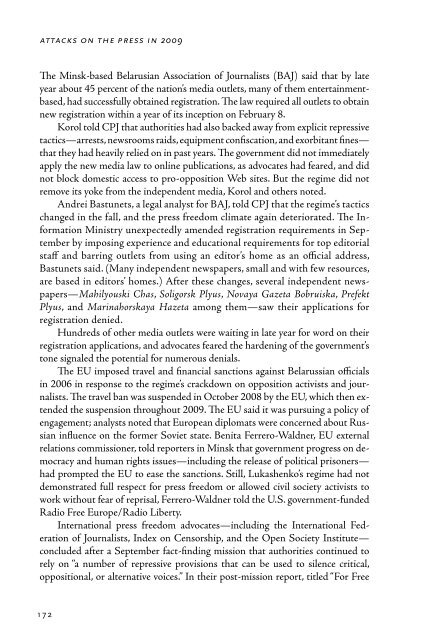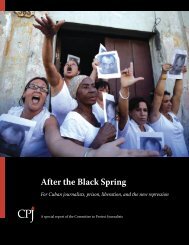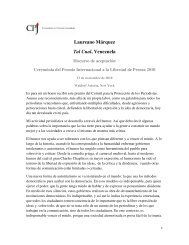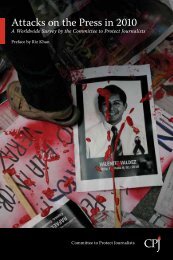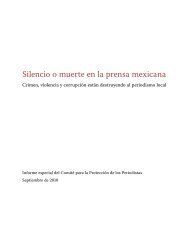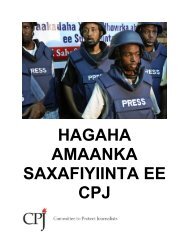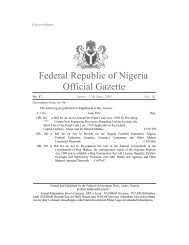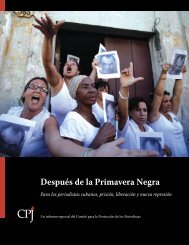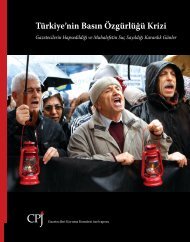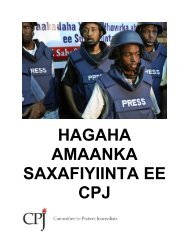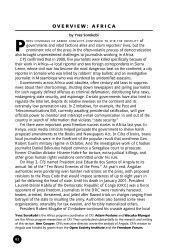Attacks on the Press - Committee to Protect Journalists
Attacks on the Press - Committee to Protect Journalists
Attacks on the Press - Committee to Protect Journalists
- No tags were found...
You also want an ePaper? Increase the reach of your titles
YUMPU automatically turns print PDFs into web optimized ePapers that Google loves.
attacks <strong>on</strong> <strong>the</strong> press in 2009europe and central asia: belarusThe Minsk-based Belarusian Associati<strong>on</strong> of <strong>Journalists</strong> (BAJ) said that by lateyear about 45 percent of <strong>the</strong> nati<strong>on</strong>’s media outlets, many of <strong>the</strong>m entertainmentbased,had successfully obtained registrati<strong>on</strong>. The law required all outlets <strong>to</strong> obtainnew registrati<strong>on</strong> within a year of its incepti<strong>on</strong> <strong>on</strong> February 8.Korol <strong>to</strong>ld CPJ that authorities had also backed away from explicit repressivetactics—arrests, newsrooms raids, equipment c<strong>on</strong>fiscati<strong>on</strong>, and exorbitant fines—that <strong>the</strong>y had heavily relied <strong>on</strong> in past years. The government did not immediatelyapply <strong>the</strong> new media law <strong>to</strong> <strong>on</strong>line publicati<strong>on</strong>s, as advocates had feared, and didnot block domestic access <strong>to</strong> pro-oppositi<strong>on</strong> Web sites. But <strong>the</strong> regime did notremove its yoke from <strong>the</strong> independent media, Korol and o<strong>the</strong>rs noted.Andrei Bastunets, a legal analyst for BAJ, <strong>to</strong>ld CPJ that <strong>the</strong> regime’s tacticschanged in <strong>the</strong> fall, and <strong>the</strong> press freedom climate again deteriorated. The Informati<strong>on</strong>Ministry unexpectedly amended registrati<strong>on</strong> requirements in Septemberby imposing experience and educati<strong>on</strong>al requirements for <strong>to</strong>p edi<strong>to</strong>rialstaff and barring outlets from using an edi<strong>to</strong>r’s home as an official address,Bastunets said. (Many independent newspapers, small and with few resources,are based in edi<strong>to</strong>rs’ homes.) After <strong>the</strong>se changes, several independent newspapers—MahilyouskiChas, Soligorsk Plyus, Novaya Gazeta Bobruiska, PrefektPlyus, and Marinahorskaya Hazeta am<strong>on</strong>g <strong>the</strong>m—saw <strong>the</strong>ir applicati<strong>on</strong>s forregistrati<strong>on</strong> denied.Hundreds of o<strong>the</strong>r media outlets were waiting in late year for word <strong>on</strong> <strong>the</strong>irregistrati<strong>on</strong> applicati<strong>on</strong>s, and advocates feared <strong>the</strong> hardening of <strong>the</strong> government’st<strong>on</strong>e signaled <strong>the</strong> potential for numerous denials.The EU imposed travel and financial sancti<strong>on</strong>s against Belarussian officialsin 2006 in resp<strong>on</strong>se <strong>to</strong> <strong>the</strong> regime’s crackdown <strong>on</strong> oppositi<strong>on</strong> activists and journalists.The travel ban was suspended in Oc<strong>to</strong>ber 2008 by <strong>the</strong> EU, which <strong>the</strong>n extended<strong>the</strong> suspensi<strong>on</strong> throughout 2009. The EU said it was pursuing a policy ofengagement; analysts noted that European diplomats were c<strong>on</strong>cerned about Russianinfluence <strong>on</strong> <strong>the</strong> former Soviet state. Benita Ferrero-Waldner, EU externalrelati<strong>on</strong>s commissi<strong>on</strong>er, <strong>to</strong>ld reporters in Minsk that government progress <strong>on</strong> democracyand human rights issues—including <strong>the</strong> release of political pris<strong>on</strong>ers—had prompted <strong>the</strong> EU <strong>to</strong> ease <strong>the</strong> sancti<strong>on</strong>s. Still, Lukashenko’s regime had notdem<strong>on</strong>strated full respect for press freedom or allowed civil society activists <strong>to</strong>work without fear of reprisal, Ferrero-Waldner <strong>to</strong>ld <strong>the</strong> U.S. government-fundedRadio Free Europe/Radio Liberty.Internati<strong>on</strong>al press freedom advocates—including <strong>the</strong> Internati<strong>on</strong>al Federati<strong>on</strong>of <strong>Journalists</strong>, Index <strong>on</strong> Censorship, and <strong>the</strong> Open Society Institute—c<strong>on</strong>cluded after a September fact-finding missi<strong>on</strong> that authorities c<strong>on</strong>tinued <strong>to</strong>rely <strong>on</strong> “a number of repressive provisi<strong>on</strong>s that can be used <strong>to</strong> silence critical,oppositi<strong>on</strong>al, or alternative voices.” In <strong>the</strong>ir post-missi<strong>on</strong> report, titled “For Freeand Fair Media in Belarus,” <strong>the</strong> groups said press freedom was threatened by <strong>the</strong>state’s m<strong>on</strong>opoly <strong>on</strong> newspaper distributi<strong>on</strong>, <strong>the</strong> regular denial of accreditati<strong>on</strong><strong>to</strong> foreign outlets and <strong>the</strong>ir local reporters, and tax and ec<strong>on</strong>omic policies thatfavor state media. BAJ noted that tax exempti<strong>on</strong>s for state media gave <strong>the</strong>m asignificant competitive advantage over private outlets.State-c<strong>on</strong>trolled distribu<strong>to</strong>rs Soyuzpechat and Belpochta c<strong>on</strong>tinued <strong>to</strong>blacklist 13 independent newspapers, including <strong>the</strong> prominent publicati<strong>on</strong>s NovyChas, Tovarishch, Vitebsky Kuryer, and Gazeta Sl<strong>on</strong>imskaya, local and internati<strong>on</strong>almedia experts said. Authorities also harassed private businesses and detained volunteerswho sought <strong>to</strong> circulate <strong>the</strong> blacklisted publicati<strong>on</strong>s, CPJ research found.The state-c<strong>on</strong>trolled distribu<strong>to</strong>rs claimed <strong>the</strong>y were acting within <strong>the</strong> law by refusing<strong>to</strong> sign service agreements with independent media outlets, Korol said.Their positi<strong>on</strong> was backed by Natalya Petkevich, a senior administrati<strong>on</strong> officialwho said <strong>the</strong> government would not force <strong>the</strong> distribu<strong>to</strong>rs <strong>to</strong> carry independentnewspapers in <strong>the</strong>ir catalogues and kiosks.Internet penetrati<strong>on</strong> in <strong>the</strong> country reached 30 percent, <strong>the</strong> state news agencyBelTA reported in March, citing government statistics. This greater access,coupled with <strong>the</strong> poor climate for <strong>the</strong> traditi<strong>on</strong>al press, led most embattled independentand pro-oppositi<strong>on</strong> media <strong>to</strong> establish <strong>the</strong>mselves <strong>on</strong> <strong>the</strong> Web, winningloyal audiences both inside <strong>the</strong> country and abroad, CPJ research shows. While<strong>the</strong> government did not exercise any notable <strong>on</strong>line censorship in 2009, its ownershipof <strong>the</strong> country’s sole Internet service provider, Beltelekom, gives it <strong>the</strong> ability<strong>to</strong> block access <strong>to</strong> critical publicati<strong>on</strong>s.Authorities were sensitive <strong>to</strong> critical coverage originating from Poland-basedbroadcasters, leading <strong>the</strong>m <strong>to</strong> target <strong>the</strong> outlets for obstructi<strong>on</strong>. Authorities barredPoland-based Radio Racyja and satellite televisi<strong>on</strong> channel Belsat from openingoffices in <strong>the</strong> country, and denied credentials <strong>to</strong> <strong>the</strong>ir reporters. In November,after a prol<strong>on</strong>ged applicati<strong>on</strong> process, <strong>the</strong> Poland-based European Radio for Belarusw<strong>on</strong> permissi<strong>on</strong> <strong>to</strong> open a bureau for <strong>on</strong>e year; <strong>the</strong> Belarusian governmentapproved <strong>the</strong> permit just as it was undergoing a periodic EU review. The ForeignMinistry denied an entry visa <strong>to</strong> Belsat Direc<strong>to</strong>r Agnieszka Romaszewska, whoplanned <strong>to</strong> attend an internati<strong>on</strong>al c<strong>on</strong>ference organized by <strong>the</strong> German Embassyin Minsk. According <strong>to</strong> <strong>the</strong> local press, <strong>the</strong> Foreign Ministry did not provide Romaszewskawith an explanati<strong>on</strong>.In March, <strong>the</strong> Informati<strong>on</strong> Ministry refused <strong>to</strong> renew accreditati<strong>on</strong> <strong>to</strong> AndrzejPoczobut, a local corresp<strong>on</strong>dent for Poland’s largest daily, Gazeta Wyborcza.Authorities <strong>to</strong>ld Poczobut his applicati<strong>on</strong> had been denied because of a seriesof articles critical of <strong>the</strong> Lukashenko administrati<strong>on</strong>. Poczobut’s articles covereda police fingerprinting initiative; <strong>the</strong> deportati<strong>on</strong> of three Polish Catholicpriests; and criminal lawsuits filed against recently released political pris<strong>on</strong>ers.172173


